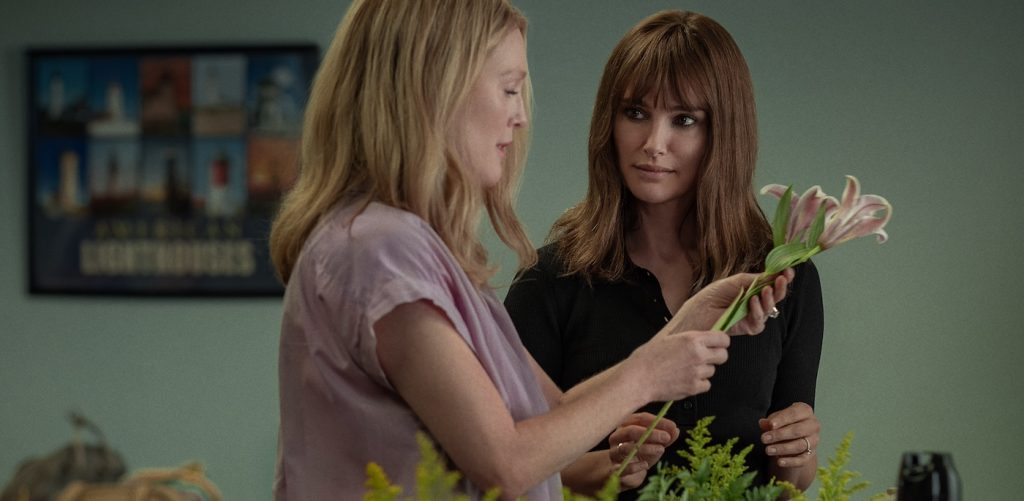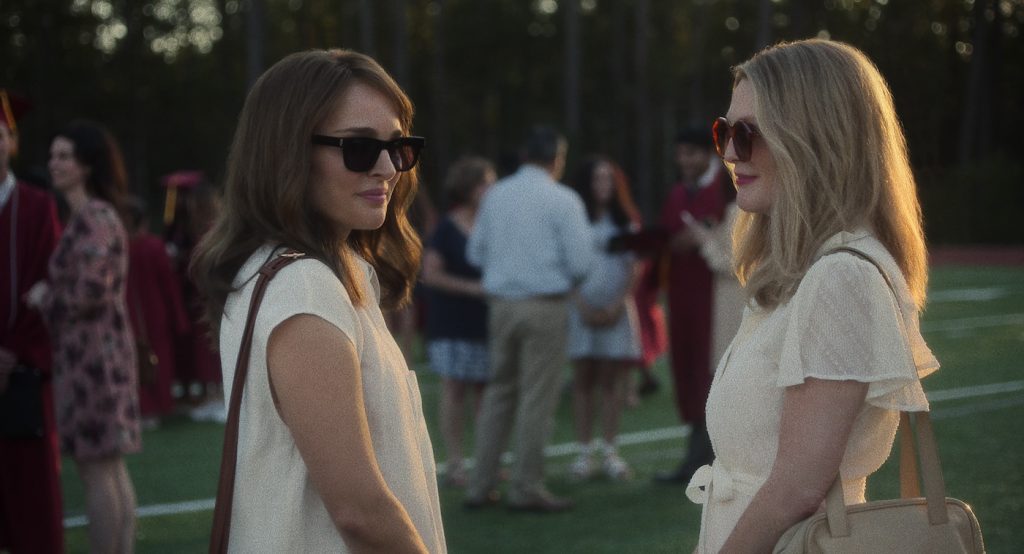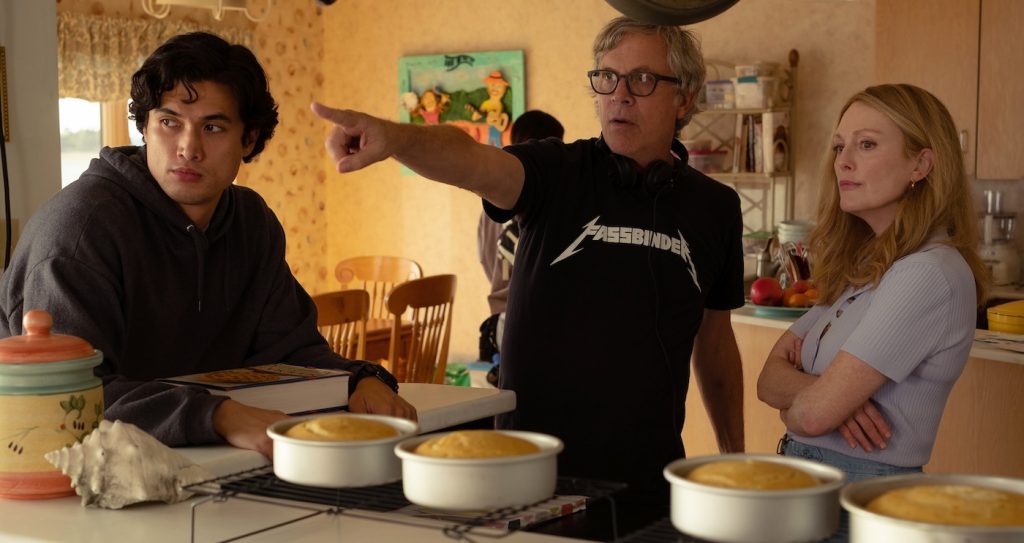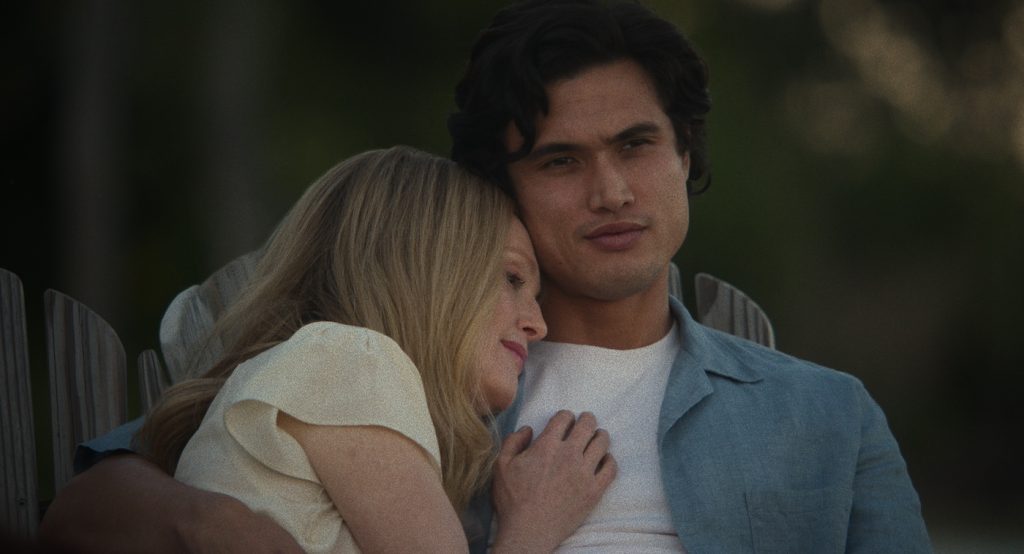“May December” Director Todd Haynes on Playing With Power in His Beguiling New Film
Beyond appreciation from critics and audiences alike for its compelling screenplay and gorgeous cinematography, Far From Heaven and Carol director Todd Haynes’s new release May December is getting awards buzz for the performances by its magnetic three leads. The film stars Haynes muse Julianne Moore, Natalie Portman, and Charles Melton as three very complicated, sometimes unlikeable characters that consistently shift the audience’s allegiances. The film is loosely based on the real-life tabloid scandal of 35-year-old teacher Mary Kay Letourneau, her sexual relationship with a 12-year-old 6th grader, and their subsequent marriage. In May December, however, screenwriter Samy Burch mines that story for a narrative that is, by turns, fascinating, funny, appalling, and awkward. All that makes for a memorable character study and a great cinematic experience.
The Credits caught up with Haynes to talk about his new film, the breathtaking scenes between Portman and Moore, the inspired casting of Charles Melton, his surprise at how audiences have received the movie and more.
The film walks a really impressive line in terms of tone. How did you work with screenwriter Samy Burch to find humor and build characters that are unlikable but fascinating and compelling enough to pull the audience in and keep them guessing?
Truly, that was all happening in Samy’s script and in her characters and how she built them. That’s not to say that there weren’t notes and changes, revisions and a discussion that went on between Sammy and myself and with Natalie and Julianne, who had brilliant notes. This is just such an incredibly coherent and confident piece of work. What wasn’t necessarily there was the stylistic component that would be part of the film, but what the script did was it trusted the audience to interpret and read and say, “Wait a minute. What?” and keep shifting how they felt about characters as events unfolded. So what my job was, the job I gave myself by taking this on, was to try to find language in a movie version of this script that would give freedom to that kind of trust in the viewer and, in fact, demand the viewer to be thinking and revising their thinking through the course of the film.

To keep that tone and keep audiences fascinated took collaborating with every single below-the-line artist. Who were some of the MVPs in that regard?
That’s such a great invitation for me to gush about the creative team that brought it all to life and filled in all of those elements. It started with Sam Lisenco, the production designer. What’s interesting about my creative team is these are a lot of new relationships for me, out of circumstance and timing and a variety of reasons. This is the first film that Sam designed for me. He and I had developed another project that didn’t happen, and my fall opened up. We checked with Natalie and Julianne, and they both had this little sliver in the fall last year that was available, so we jumped on it. One thing led to the next, in the way movies happen, and the team all kept filling in, and in many ways, making so much more concrete and specific what this movie was going to be. Some of it was by sheer accident.

How did all that take shape?
Well, the film, based on the narrative, had to take place in May, but it was set in Camden, Maine. We couldn’t possibly shoot the movie in the late fall in Camden, Maine, or the eastern seaboard for May, so we had to think of a different location. Sam and I went to Savannah, Georgia, in August and started to scout. It was through instinct and intuition and circumstance that all these things started to fill out. Ed Lachman, who’s been shooting my films so gorgeously and is just a master and a dear friend, was going to shoot this, and then he injured his leg. I had to replace him very late in the game. I thought of Chris Blauvelt, whose work I’d been watching so closely and with such incredible admiration, especially the stuff he’d done with my friend Kelly Reichardt, all in my backyard of Portland, Oregon. Also, April Napier, the costume designer on May December, I’d never worked with before, and she came from Kelly’s movies and had worked with Chris and was available. Those kinds of things all started to fill in.

Charles Melton really represents transformation in the film, and he’s so good it’s hard to imagine anyone else playing that character.
Finding Charles Melton was one of the most essential creative choices in this film. He was an actor whose work I didn’t know, and it was his reading on tape that informed me. It gave me insight into Joe that was way ahead of me in how he understood this character, but it enabled me to see the past story and the present story in the same body of this man.

The film plays with the idea of femininity and gender roles in a really interesting way.
This is an inverted world where women’s desires and wills are driving the story, and I don’t find that this is any kind of correction of patriarchal power. I think this is a usurpation of patriarchal power by women against men, but it’s the same kind of power. It’s the older woman/younger man relationship that is at the core of this story and this question, and so too is the beauty of the young man and how that has also been a force in Western society and culture and something that negates or blurs the ethical questions around it. It certainly did in the Greco-Roman era, but even in this story, or at least in the mythology that you suspect is shared, the internal narrative Gracie and Joe have, where he’s some kind of knight in shining armor and this handsome young adolescent boy who is going to come and save the poor princess in the tower.

The eternal ingenue.
Exactly. But that’s a way of denying the age difference and the power discrepancy between these two people, pretending to endow him with all this power. And again, that’s another aspect of patriarchal culture is endowing the man with all the power, even if he’s 13 years old. So it’s a complex, disturbing, but ultimately revelatory story about culture, and it has inversions that are surprising and humorous and disturbing again, and then it has this sense of hope, I think, all oriented around Charles and his kids, and where they may go from here.
The best quality of May December, however awkward or uncomfortable the film may make people feel, is that people are still choosing to see it, enjoying it, asking questions, and thinking about it.
What’s weird is people are somehow digging that right now, and I don’t necessarily think that’s how I would have taken the temperature of our contemporary culture, that people are comfortable being uncertain and asking big moral questions about things. It’s been really exciting to see that audiences are interested in going to this place. It’s very cool.
May December streams on currently in select art house theaters, and streams on Netflix on December 1st.
For more on May December, check out these stories:
“May December” Screenwriter Samy Burch Unpacks the Unspoken in Todd Haynes’ New Film
“May December” Editor Affonso Gonçalves on Playing With Identity in Todd Haynes’ New Film
Featured image: May December. (L to R) Natalie Portman as Elizabeth Berry and Julianne Moore as Gracie Atherton-Yoo in May December. Cr. Francois Duhamel / courtesy of Netflix



